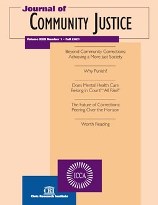Critical Time Intervention
Author: Jeffrey Draine, M.S.W., Ph.D.; Daniel Herman, M.S., D.S.W..
Source: Volume 20, Number 01, Fall 2010 , pp.11-18(8)

< previous article |next article > |return to table of contents
Abstract:
As mental health policymakers continue their struggle to shape an effective system in the post-deinstitutionalization era, service providers are confronted by groups of people with mental illnesses who do not fit well into contemporary service categories or structures. Initially marginalized by existing services, these groups have more recently become the focus of concerted efforts to serve them. Thus, the need to effectively meet the mental health needs of homeless and street-dwelling people has been a major concern since the 1980s, leading to emerging systems of outreach, housing, treatment, and supported and supportive housing for homeless people with mental illnesses. Critical Time Intervention (CTI) has emerged as an evidence-based practice intended to smooth the transition between institutional and community living by providing phased, targeted transitional assistance that links persons with mental illnesses to ongoing sources of community support and treatment. Growing evidence for CTI’s efficacy has led to its mention in the 1999 President’s New Freedom Commission Report on Mental Health (2003) as well as its being included in the Substance Abuse and Mental Health Services Administration’s National Registry of Evidence-Based Programs and Practices. This article reviews the applicability of CTI to prison and jail reentry for persons with mental illnesses, frames the criminalization of the mental illness issue, and clarifies the role that mental health interventions can take in this area. In this context, CTI is situated in current thinking regarding community integration of people with psychiatric disabilities as well as recent developments in reentry and support for people leaving prisons. Implications for service and for policy are also reviewed.Keywords: Mental illness; homelessness; crisis intervention; reentry planning
Affiliations:
1: University of Pennsylvania School of Social Policy and Practice; 2: Columbia University Mailman School of Public Health.